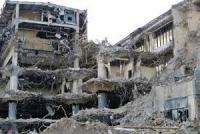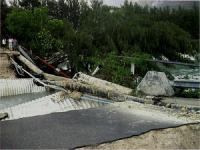-
Rising seas disrupt local economies
Impacts from climate change are not always easy to see. But for many local businesses in coastal communities across the United States, the evidence is right outside their doors – or in their parking lots. High-tide flooding resulting from climate change is already disrupting the economy of Annapolis, Maryland. As sea levels rise, the impacts are expected to get worse for coastal communities.
-
-
Huawei espionage arrests in Poland: A wake-up call to Europe
U.S. and European intelligence services have been warning that Huawei, a jewel in the crown of the China’s growing technology industry, cannot be trusted in its protestations that it does not cooperate with the country’s intelligence agencies, or that it respects the rule of law and the intellectual property of its competitors. European governments should exclude Huawei from their telecommunications infrastructure before the company becomes too enmeshed in the continent’s 5G systems to be fully, securely, and painlessly removed at a later date. Failure to do so would give China truly unprecedented tools to corrupt, influence, and subvert Western democracies and the rule of law that is so vital to their continued health and the health of the post-War international system.
-
-
Keeping the lights on during and after a disaster

The threat of an inevitable earthquake is the uncomfortable truth we all face in the Cascadia Subduction Zone, which stretches from Alaska to California. Because the last major earthquake in the area was in the 1700s, our infrastructure developed without an appreciation and understanding of earthquake resilience. That means the next major earthquake will likely devastate our buildings, roads, bridges, and utility providers, posing immediate risks for the health and safety of those who live in the region. And later, there will be long-term economic aftershocks.
-
-
Using data utilization to augment community resilience, disaster response
A civil engineering who researches resilience against extreme events and natural hazards is responding to lessons learned from California’s deadly Camp Fire by outlining how to utilize the power of data to improve disaster response and minimize economic loss and human harm in similar events.
-
-
Paradigm shift needed for making bridges tsunami-resistant

Over the past fifteen years, big earthquakes whose epicenters were in the ocean off the coasts of Japan and Indonesia have caused tsunamis that killed more than 250,000 people and caused more than $200 billion in damage. The damage includes washing away or otherwise dislodging hundreds of bridges, emphasizing the need to better understand the wave impacts’ underlying physics. Researchers argue in a new study that a paradigm shift is needed for assessing bridges’ tsunami risk.
-
-
Lawmakers tell Pentagon to redo climate change report
Earlier this month, the Pentagon, in compliance with a congressional mandate, released a landmark report which identified the 79 American military installations most vulnerable to the “effects of a changing climate.” Several Democrats on the House Armed Services Committee welcomed the report – but at the same time harshly criticized it for failing to include details requested by Congress, among them the estimates by each of the armed services of the cost of protecting or replacing the ten most vulnerable military bases.
-
-
Rising seas: to keep humans safe, let nature shape the coast
Even under the most conservative climate change scenarios, sea levels 30cm higher than at present seem all but certain on much of the U.K.’s coast by the end of this century. Depending on emission scenarios, sea levels one meter higher than at present by 2100 are also plausible. The knee-jerk reaction to sea level rise has traditionally been to maintain the shoreline’s position at all cost, by building new flood defense structures or upgrading old ones, but this traditional approach of “grey” engineered sea defenses locks society into ever increasing costs of replacement and maintenance. The alternatives are “nature-based solutions” to coastal flooding and erosion, which work with natural processes to reduce flood risk and incorporate ecosystems into flood defense.
-
-
Under-road heating system to keep Europe’s highways ice-free
Snow and ice can dramatically change the conditions of a road, where slippery surfaces make it harder to keep control of a vehicle, particularly when braking or turning. Under-road heating that melts ice and snow within 15 minutes and real-time information about icy road conditions could help prevent wintertime accidents.
-
-
Understudied terrorists put under a microscope
Bombs exploding, hostages taken and masked gunmen firing machine guns are all types of terrorist attacks we’ve seen. According to a new study, it’s the attacks we don’t see – cyberattacks – that happen more often and can cause greater destruction. “Little work has been done around the use of the internet as an attack space,” said Thomas Holt, Michigan State University professor of criminal justice and lead author. “The bottom line is that these attacks are happening and they’re overlooked. If we don’t get a handle understanding them now, we won’t fully understand the scope of the threats today and how to prevent larger mobilization efforts in the future.”
-
-
Preparing for extreme weather
From high winds and heavy rainfall to droughts and plummeting temperatures, people in Europe have already begun to feel the effects of extreme weather. As we get used to this new reality, scientists are investigating how it will affect how we get around and whether our infrastructure can cope.
-
-
Coastal wetlands need to move inland in fight against climate change
Up to 30 percent of coastal wetlands could be lost globally as a result of rising sea levels, with a dramatic effect on global warming and coastal flooding, if action is not taken to protect them, new research warns. The global study suggests that the future of global coastal wetlands, including tidal marshes and mangroves, could be secured if they were able to migrate further inland.
-
-
How Russia hacked U.S. power grid
In an aptly titled investigative report — “America’s Electric Grid Has a Vulnerable Back Door—and Russia Walked Through It” — the Wall Street Journal has used “documents, computer records and interviews” to reconstruct exactly how Russian hackers accessed the U.S. electric grid in the spring of 2016, an attack that continued through 2017 and possibly 2018.
-
-
U.S. Interstate highways need overhaul, requiring government’s commitment, funding
The future of the U.S. Interstate Highway System is threatened by a persistent and growing backlog of structural and operational deficiencies and by various looming challenges, such as the progress of automated vehicles, developments in electric vehicles, and vulnerabilities due to climate change. Unless a commitment is made to remedy the system’s deficiencies and prepare for these oncoming challenges, there is a real risk that the nation’s interstates will become increasingly unreliable and congested, far more costly to maintain, less safe, incompatible with evolving technology, and vulnerable to the effects of extreme weather, says a new congressionally mandated report from the National Academies of Sciences.
-
-
Using the National Climate Assessment to prepare for climate change
Every four years, the National Climate Assessment evaluates the state of climate science and the impact of climate change in the U.S., now and into the future. The most recent NCA was released on Black Friday, and many cities, states, businesses, and local communities are ready to take action on climate change—and they’re wondering how to go about it.
-
-
Fault displacement “fingerprints” helps forecast magnitude of rupture
Machine-learning research helps detect seismic signals accurately, allowing them to predict the Cascadia fault’s slow slippage, a type of failure observed to precede large earthquakes in other subduction zones.
-
- All
- Regional
- Water
- Biometrics
- Borders/Immig
- Business
- Cybersecurity
- Detection
- Disasters
- Government
- Infrastructure
- International
- Public health
- Public Safety
- Communication interoperabillity
- Emergency services
- Emergency medical services
- Fire
- First response
- IEDs
- Law Enforcement
- Law Enforcement Technology
- Military technology
- Nonlethal weapons
- Nuclear weapons
- Personal protection equipment
- Police
- Notification /alert systems
- Situational awareness
- Weapons systems
- Sci-Tech
- Sector Reports
- Surveillance
- Transportation
Advertising & Marketing: advertise@newswirepubs.com
Editorial: editor@newswirepubs.com
General: info@newswirepubs.com
2010-2011 © News Wire Publications, LLC News Wire Publications, LLC
220 Old Country Road | Suite 200 | Mineola | New York | 11501
Permissions and Policies
Editorial: editor@newswirepubs.com
General: info@newswirepubs.com
2010-2011 © News Wire Publications, LLC News Wire Publications, LLC
220 Old Country Road | Suite 200 | Mineola | New York | 11501
Permissions and Policies
